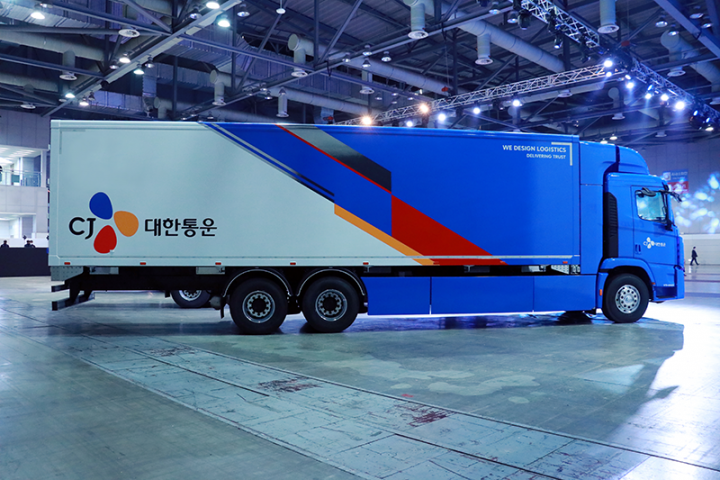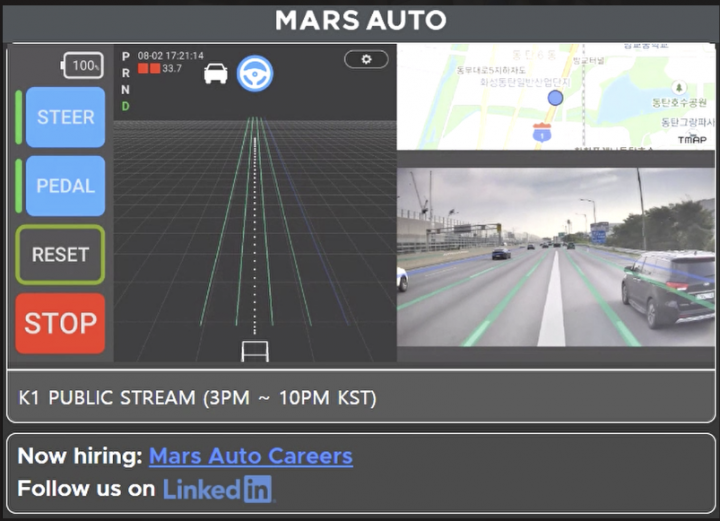Partnership with Mars Auto seeks to strengthen safety, reduce workload and expand CJ Logistics’ automated freight services

CJ Logistics, a leading innovative supply chain and technology company, plans to expand logistics automation with the introduction of autonomous driving technology for its delivery transport trucks.
11-ton Trucks Loaded With Actual Parcels to Travel 135 Miles Six Times a Week
On March 14, CJ Logistics announced that it will begin a pilot project with autonomous driving startup Mars Auto to utilize autonomous driving trucks as parcel vehicles. The project will see an 11-ton autonomous truck loaded with actual parcels travel on a 135-mile (218km) truck route from CJ Logistics’ Incheon Center to the Okcheon Hub Terminal six times a week. The pilot project, starting in late March and running for roughly a year, aims to improve the efficacy of autonomous driving before its future full implementation.
Generally, large trucks of 11 tons or more face unique challenges in autonomous driving due to their size and weight, resulting in longer braking distances that demand fast judgment and accurate prediction. At the same time, however, truck vehicles have the advantage of operating the same route every day, and of highways accounting for most of the journey.
Approximately 93% of the driving distance of the Incheon-Okcheon truck route is on highways. CJ Logistics’ autonomous driving truck will operate manually in urban areas and switch to autonomous driving on the highway. With the driver on board in case of emergencies, it will be possible to switch to manual driving if necessary.
CJ Logistics has carried out phase-by-phase autonomous driving performance verification over several years, conducting four trials of the 37-miles (60km) journey from the Danwon Sub-Terminal to the Gonjiam Hub Terminal in 2022, and six trials of the 135-miles (258km) drive from the Gunpo Sub-Terminal to the Daejeon Hub Terminal in 2023 with real cargo and exposed to various conditions including day/night, rain and tunnels. The trials also integrated multiple emergency preparedness tests.
Enhancing Safety and Reducing Workload Through Autonomous Driving

CJ Logistics anticipates that autonomous driving will reduce the workload of truck drivers and enhance safety. The job of driving freight trucks, especially over long distances on highways at night, can be highly fatiguing for drivers. With highway driving constituting around 97% of middle-mile transport, the company expects the full integration of autonomous truck driving to address these challenges highly effectively.
The revision of Korea’s Autonomous Vehicle Act at the end of February established the regulatory framework for certifying the performance and safety of self-driving vehicles, paving the way for commercialization.
To further advance its autonomous driving system, CJ Logistics has initiated a pilot project with Mars Auto. Building upon this collaboration, the company aims to gradually expand autonomous driving routes and vehicle applications. Beyond driving, there are plans to expedite the development of other logistics automation technologies, such as unmanned shuttles in ports and autonomous docking at terminal docks.
“We expect to build a more advanced autonomous driving system through collaboration with Mars Auto, which offers exceptional differentiated technological capabilities,” said Kim Kyung-hoon, Director of CJ Logistics’ TES Innovation Center. “Through continuous innovation and research and development, we will expand automation technology capabilities across numerous logistics sites.”











